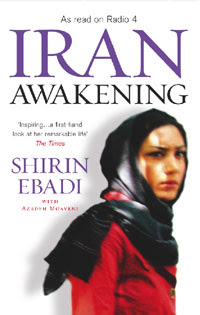 With Iran at the focus of much international attention, this memoir by Nobel Peace Prize winner, Shirin Ebadi, gives a fascinating background to the country that has gone through a series of revolutions, awakenings and regressions in only a few decades.
With Iran at the focus of much international attention, this memoir by Nobel Peace Prize winner, Shirin Ebadi, gives a fascinating background to the country that has gone through a series of revolutions, awakenings and regressions in only a few decades.Iran Awakening is a frightening account of the overthrow of the Shah and the establishment of a fundamentalist religious regime in which critics of the government are imprisoned and murdered.
Ebadi highlights how certain events, such as the burning of a crowded cinema in 1978 and the death of 400 people, prompted people to protest and overthrow the Shah. The author also exposes the negative aspects of crowd movements for their hailing of Ayatollah Khomeini quickly turned to howls. Her analysis of these national movements points up the importance of the media and the legal profession when their representatives are doing their job well. For anyone thinking through the issue of the separation of religion and the state, this book gives ample comment and illustration.
Shirin Ebadi recounts her early life experiences, her training and service as a judge, and how she reacted when her influential job was taken from her and she became sidelined. Some instances of injustice and cruelty towards members of her extended family galvanized her commitment to work for battered children, women who were hostage in abusive marriages and political prisoners. Taking up the legal cases that others wouldn’t touch, Ebadi puts her own life at risk and for her courage in staying in Iran and being a champion of the rights of the vulnerable she is harassed, threatened and imprisoned.
It is illuminating to read the thoughts of a Muslim woman who has a deep faith, asks the hard questions and is eager to encourage the fulfillment of women. Ebadi baulks at the way under the strict Islamic code a man’s life is worth twice that of a woman and how this understanding translates in such things as a limited access to education by women, fewer professional opportunities and a much higher unemployment rate.
Iran Awakening is an important book for Muslims to read as Ebadi, a devout Muslim, is able to spell out the forbidding side of the theocracy that sparked the Islamic Revolution in Iran. She describes how the government espoused an ideology that made the family the centerpiece of its action but in reality, it used theology to introduce news laws that were oppressive toward women and children. These memoirs assist readers in reflecting upon the levels of flexibility one has in applying seventh century texts and conventions to contemporary situations.
In her epilogue Ebadi says, “I wanted to write a book that would help correct Western stereotypes of Islam, especially the image of Muslim women as docile, forlorn creatures.” (p210) This book reveals one striking representative of those Iranian women who have stood up for the rights of women but the book reinforces the stereotypes that the author wanted to shatter. Ebadi’s candid remarks about her husband’s expectations that she does the cooking, the housework and the bulk of the caring for the children (even though he supported her activism), illustrate graphically the practical limits of gender equality.
Despite her frankness about many aspects of Iranian life, the author indicates that her voice has been muted: “The censorship that prevails in the Islamic Republic has made it impossible to publish an honest account of my life here.” Perhaps Ebadi’s book has escaped the full impact of the censor’s pen only because of her international standing as a Nobel Peace Prize recipient.
Shirin Ebadi with Azadeh Moaveni, Iran Awakening (London: Rider, 2006). This book is available from Magrudy’s Bookshops in the UAE at a cost of Dh 56.00.
A picture of Shirin Ebadi and one of her stories is posted at:
Stories for Speakers and Writers.
Geoff Pound
Image: Front cover of Iran Awakening.



